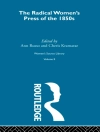A fresh, nuanced view of Veza Canetti’s literary career and its relationship to that of her famous husband.
The Viennese playwright, novelist, and short-story writer Veza Canetti was born in 1897 into a mixed Sephardic-Ashkenazi Jewish family and died in 1963 in London. Part of the avant garde in 1920s Vienna (where she met her future husband and Nobel Prize winner, Elias Canetti), from 1932 she wrote radical short stories drawn from everyday life for the Vienna
Arbeiter-Zeitung. After censorship under the so-called Corporate State reduced her opportunities for publication, she disguised her critique in irony and humor, but from then on published little. Until 1990, when her first novel,
Yellow Street, was finally published, Veza was known only as her husband’s muse and literary assistant. As more of her writings appeared, critics became convinced that it was he who was responsible for her decline into obscurity, notwithstanding his protestations of support and admiration. This biography tells a more nuanced story, presenting Veza’s literary career against the background of her troubled times, drawing on Elias’s unpublished papers to assess their literary partnership, showing how their early writings constituted a private dialogue on topics as diverse as feminism and Jewish identity and how several key themes in his work are anticipated in hers.
Julian Preece is Professor of German at the University of Wales, Swansea.
表中的内容
Introduction
A Lost Literary Life Recovered: Veza Canetti
The Case of Veza Magd
Shared Beginnings
Workers’ Writer: Veza at the
Arbeiter-Zeitung, 1932-33
What’s in a Name? On Maids
Writing under Cover, 1934-38
Portraits
Rivalry and Partnership
Works Cited
Index
关于作者
JULIAN PREECE is Professor and Chair of German at Swansea University, UK.












